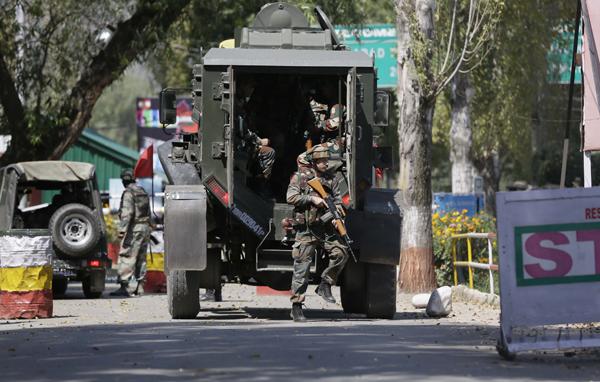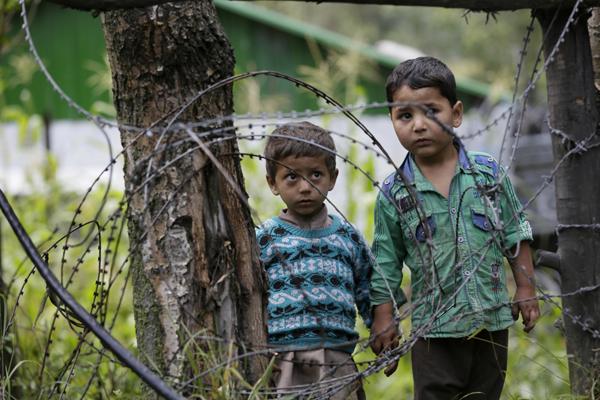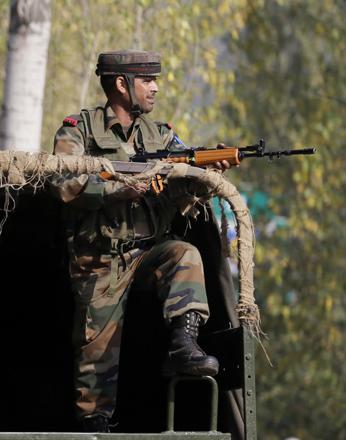You are here
India blames Pakistan as Kashmir army base attack kills 17 soldiers
By Reuters - Sep 18,2016 - Last updated at Sep 18,2016

Indian army soldiers arrive at the army base which was attacked by suspected rebels in the town of Uri, west of Srinagar, Indian controlled Kashmir, on Sunday (AP photo)
SRINAGAR, India — India accused Pakistan of being behind a separatist attack on an army base near their disputed frontier on Sunday that killed 17 soldiers, in one of the most deadly attacks in Kashmir in a quarter-century-old insurgency.
Four commando-style gunmen, armed with AK-47 assault rifles and grenade launchers, burst into the brigade headquarters in Uri at 5:30am (midnight GMT) and were killed after a three-hour gunfight, a senior Indian army officer said.
The incident sharply increased tensions between the bitter, nuclear-armed rivals and will raise fears of a potential military escalation. Indian and Pakistani troops are in close proximity in many places along one of the world's most heavily militarised frontiers, and exchanges of fire are not uncommon.
Lieutenant General Ranbir Singh told reporters in New Delhi that Sunday's attack bore the hallmarks of Pakistan-based militant group Jaish-e-Mohammed. Evidence gathered at the scene indicated the attackers were foreign and their equipment bore Pakistani markings, he added.
"Our men are ready to give a befitting response," Singh said in response to a reporter's question. He did not elaborate.
Pakistan denied any involvement.
Earlier, Indian Prime Minister Narendra Modi, who in recent weeks has signalled a more muscular approach in his country's rivalry with Pakistan, strongly condemned what he called the "cowardly terror attack".
"I assure the nation that those behind this despicable attack will not go unpunished," Modi said in a series of Twitter posts.
The raid came as tensions were already running high in India's only Muslim-majority region, which has faced more than two months of protests after the July 8 killing of a commander of another Pakistan-based separatist group.
At least 78 civilians have been killed and thousands injured in street clashes with Indian security forces, who have been criticised by human rights groups for using excessive force.
In an even stronger response, Indian Home Minister Rajnath Singh tweeted: "Pakistan is a terrorist state and should be identified and isolated as such."
Pakistan rejected allegations that it was involved. "India immediately puts blame on Pakistan without doing any investigation. We reject this," foreign ministry spokesman Nafees Zakaria told Reuters.
India has blamed Pakistan-based militant groups for a string of attacks on its territory — including an assault on Mumbai in 2008 that killed 166 people.
The two countries have fought two of their three wars since independence from Britain in 1947 over Kashmir, which is divided between them along a de facto border known as the "Line of Control". Both claim the former princely state in full.
Choppers fly in, smoke rises
Most of the fatalities happened in army tents and temporary shelters that caught fire from incendiary ammunition used by the attackers, Singh, the Indian army's director general of military operations, told the briefing in New Delhi.
He informed his Pakistani counterpart of his findings, which linked the attack on Uri to a similar raid in January on an Indian Air Force base in Punjab that India also blames on Jaish-e-Mohammed.
The Pakistani army confirmed in a statement that the Indian side had established contact via a hotline. Its military operations chief "reiterated that no infiltration is allowed from Pakistani soil", it said.
Reuters television footage showed helicopters flying in to evacuate the injured as an operation continued to secure the area. Smoke rose from the compound, set in mountainous terrain. The defence ministry earlier put the number of wounded at 35.
Singh, the home minister, chaired a crisis meeting in New Delhi and cancelled trips to Russia and the United States. The army chief of staff headed to Uri, roughly halfway between Indian Kashmir's summer capital Srinagar and Islamabad, to investigate the attack.
"There are definite and conclusive indications that the perpetrators of Uri attack were highly trained, heavily armed and specially equipped," Singh said in a series of strongly worded tweets that were confirmed as genuine by his office.
The US State Department "strongly condemned" the Uri attack, which comes weeks after Secretary of State John Kerry visited New Delhi.
After that meeting Kerry urged Pakistan to do more to combat terrorism, while also announcing the resumption of trilateral talks with India and Afghanistan this month in New York, leaving Islamabad looking isolated.
Worst body count in years
The military death toll was one of the worst India has suffered in a single incident during years of conflict in its northernmost territory.
Before this attack, 102 people had been killed in separatist violence in India's part of the Himalayan region this year. Among them were 30 security personnel, 71 militants and one civilian, according to a tally by the New Delhi-based South Asia Terrorism Portal.
Modi recently raised the stakes in the neighbours' decades-old feud by expressing support for separatists in Pakistan's resource-rich Baluchistan province.
Pakistan has, meanwhile, called on the United Nations and the international community to investigate atrocities it alleges have been committed by Indian security forces in Kashmir.
The UN is preparing to hold its annual general assembly in New York, where Kashmir is likely to come on to the agenda amid concerns that India's tough rhetoric could herald a military escalation between the old foes.
Senior Indian journalist and commentator Shekhar Gupta said Pakistan would be "delusional" to think that India would not respond. "This India has moved on from old strategic restraint," he said.
Relations between India and Pakistan have been on edge since the New-Year attack on the Pathankot Air force Base in Punjab, near the border with Pakistan, that killed seven uniformed men.
After initial progress, an attempt to conduct a joint investigation into the air base attack lost momentum and a tentative peace dialogue has stalled.
Related Articles
NEW DELHI —Indian and Pakistani troops exchanged fresh fire across their border on Saturday as UN chief Ban Ki-moon offered to mediate betwe
ISLAMABAD — Pakistan's air force closed a major highway on Thursday to let it practice landing jets on the road, in what it said was routine
Srinagar, India — India's prime minister on Monday summoned top security advisers to thrash out a response to a deadly raid on a Kashmir arm


















